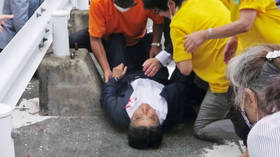Japan’s ruling coalition secures power to fulfill ‘Abe’s dream’

Japan's Liberal Democratic Party, alongside its government coalition partner Komeito, have won enough seats to comfortably secure the two-thirds majority needed to push forward with long-debated constitutional changes, according to local media.
The ruling coalition claimed 76 of the 125 seats up for grabs on Sunday, expanding its majority in the House of Councillors. It is unclear if the shocking assassination of former PM Shinzo Abe during a campaign event on Friday had any result on the outcome, as turnout remained relatively low at only 52 percent.
“The election, which is the foundation of democracy, was challenged by violence and it carries a big meaning that the election was carried through. I will continue to work hard to protect democracy,” Prime Minister Fumio Kishida said following the vote, according to Kyodo, after previously declaring “we must never allow violence to suppress speech.”
Meanwhile, the leader of the opposition Constitutional Democratic Party, Kenta Izumi, conceded defeat saying it was clear “voters did not want to switch from the LDP and entrust us with running the government.”
Following a decisive victory, Kishida’s ruling coalition has all but guaranteed its dominance until the next general election in 2025. According to Kyodo and the Asahi Shimbun, the renewed public mandate will allow it to pursue longer-term policies – such as a constitutional reform dubbed an “unaccomplished goal” and a long-held “dream” of the slain former leader.
“We will deepen parliamentary debate over the Constitution further so a concrete amendment proposal can be compiled,” Kishida said on Sunday, confirming the ruling coalition’s intention to revise the country’s “pacifist” constitution which was designed after the defeat of militarist Japan during WWII.
Article 9 of the constitution stipulates that “the Japanese people forever renounce war as a sovereign right of the nation,” as well as refuse to use force or threat in the international field. In line with this pacifist stance, the country is allowed to only maintain a self-defense force of limited capabilities, used for homeland defense.
In reality, however, the Japanese Self-Defense Forces have already grown into a full-fledged military, featuring all the main branches packed with modern hardware. The country has nearly 250,000 active-duty soldiers, as well as a vast fleet of combat aircraft and naval vessels.
Former-PM Abe was shot in the back and mortally wounded in broad daylight in the western prefecture of Nara during a campaign event on Friday. The killer was apprehended at the scene, with a hand-made shotgun seized from him.
While the suspect reportedly initially told the police he “intended” to kill Abe, authorities later said he had no “grudge against the political beliefs of the former prime minister.” According to local media reports, the suspect had initially planned to slay a leader of an undisclosed “specific organization,” believing it was responsible for bankrupting his mother, but eventually went for the veteran politician he believed was somehow involved with the group.













